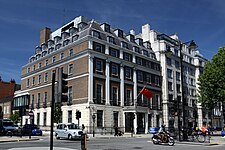Embassy of China, London
| Embassy of China in London | |
|---|---|
 |
|
| Coordinates | 51°31′16″N 0°08′44″W / 51.52102°N 0.14548°WCoordinates: 51°31′16″N 0°08′44″W / 51.52102°N 0.14548°W |
| Location | Marylebone, London |
| Address | 49–51 Portland Place, London W1B 1JL |
| Ambassador | Liu Xiaoming |
The Embassy of China in London is the diplomatic mission of China in the United Kingdom. The Embassy in London is China's only embassy in the UK, alongside two Consulates-General in Edinburgh and Manchester. Established in 1877 as the Chinese Legation, the London mission was China's first permanent overseas diplomatic mission. It has served as the diplomatic mission of the Qing Empire, Republic of China and (since 1950) the People's Republic of China. It was the location of the Qing Empire's detention of Sun Yat-sen, an important episode in the Chinese revolution of 1911. It remains today the focal point for events relating to China held in the United Kingdom, including celebrations in 2012 to commemorate 40 years of diplomatic relations between the UK and the People's Republic of China.
Most applications by UK citizens for visas to China are not handled by the embassy, however, but are instead processed by the China Visa Applications Centre, also located in London. There is a constant police presence outside the embassy.
China also maintains several other buildings in London: a Defence Section at 25 Lyndhurst Road, Hampstead, a Commercial Section at 16 Lancaster Gate, Paddington, a Cultural Section at 11 West Heath Road, Hampstead and a Science & Technology Section at 10 Greville Place, Maida Vale.
The Embassy has in recent years been the site of protests against actions of the Chinese government, including protests against the imprisonment of artist Ai Weiwei, and in favour of Tibetan independence. There has been a Falun Gong protestor sitting opposite the embassy for many years; this is referenced in the novel Saturday by Ian McEwan.
...
Wikipedia
